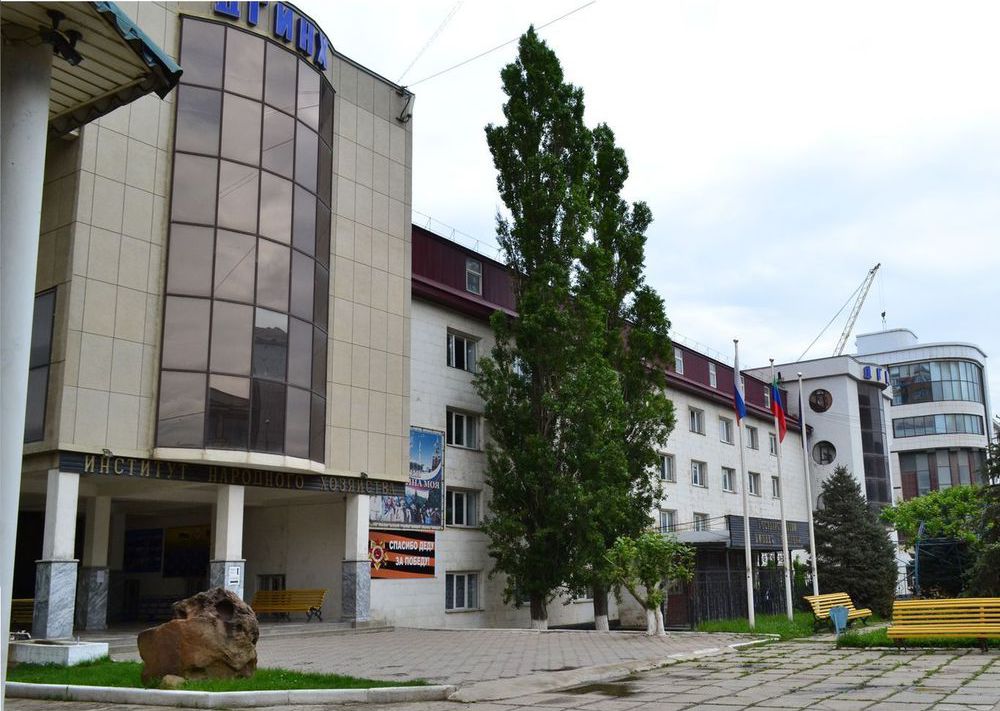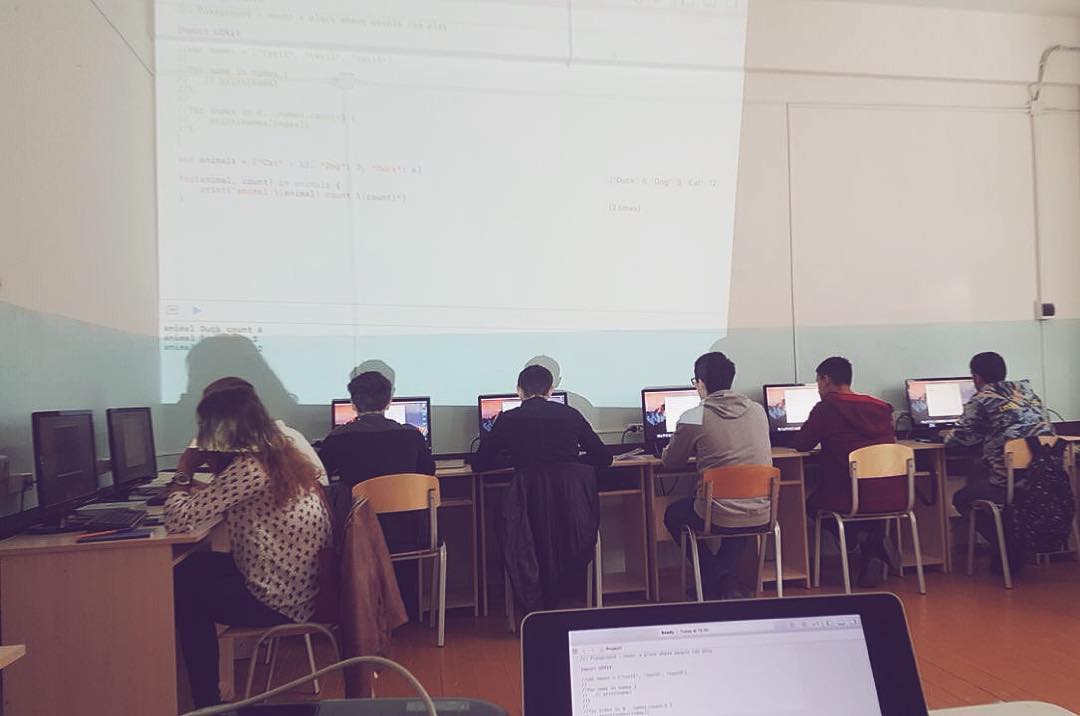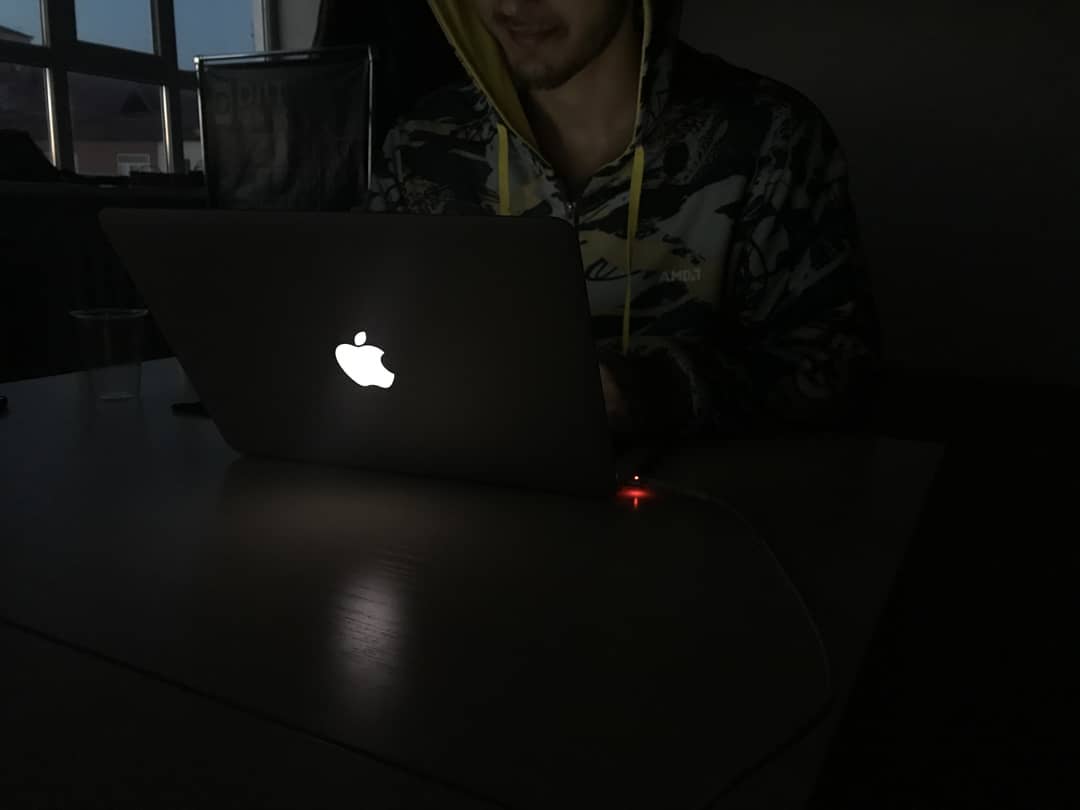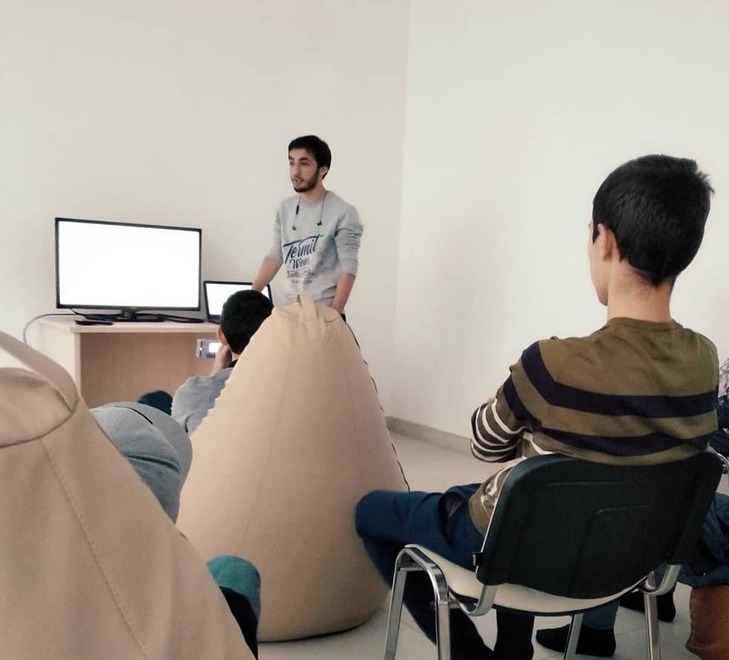From a warehouse in Dagestan - to programmers: how I became an iOS developer from scratch
The story is about how a simple guy from a depressed region of Russia is trying to make himself known - and that stereotypes are shit.
Hey. My name is Daniyal Devetov, I am an iOS developer at FINCH. While I am still a junior, but strong, I would even say “almost middle”.
I come from the city of Makhachkala, the capital of the sunny and beloved Dagestan. Yes, of the same Dagestan, where, according to many of our compatriots, come from only athletes and guys who come to Moscow to “restore order” . This, of course, impedes career development - stereotypes are such stereotypes! Although, in fact, Dagestan raised many successful people in IT - like Tagir Magomedov from Uber and Kamil Nasrullaev from Mail.ru.
My path to IT began at the age of 18. Now I’m almost 20, and I have a background of 1.5 years of continuous production experience. From the moment I became a programmer, questions from fellow countrymen very often come up: “Wow, how cool it is to sit at a computer all day and earn a bunch of dough - how would I do that?” Where I come from, people often do not believe that you can break into such a prestigious profession and work in a warm office for good money.
In this article I will tell you how from the 1C operator in the beer warehouse I grew up to the iOS programmer in a large Moscow company. I hope that my example will inspire someone else from depressed regions to develop and not give up!
A place where nothing is taught
My career path began with the fact that I ACCEPTED to come in pairs to my college. In fact, I didn’t especially plan to study, and even more so to get a higher education. As early as 13 years old I thought: “what for do I have a university to which still to study and study? It’s necessary to earn money faster! ” So I didn’t even really think where to give documents after the end of 9 classes.
I entered a business college at the State Dagestan University of National Economy. I don’t know where the programming department came from. In general, the college was famous for the fact that anyone could get there. On a stream of 700 people, 1200 were recruited, and in the first year, 300 of the most “beaten-off” students were screened out.

Outside, college looks something like this
Those who usually didn’t know what they want from this life usually entered the programming department. At the same time, parents told them that they need to go to college and get a diploma, a good profession, and so on. Upon admission, they see programming, think, “It's fashionable now, well, I kind of know how to work with a computer” - and submit documents. Therefore, if there are 1000 people in the stream at the faculty, then in the best case, about 50 generally understand what programming is. And with a successful combination of circumstances, 10-15 of them can break through somewhere. Imagine what my chances were!
The training itself looks like this. In the first two courses there is nothing specialized. In the third year, programming begins - the teacher comes and starts lecturing about Pascal ABC. In the second semester of the third year, a teacher appears who talks about what C # is. In the fourth year, the material is repeated.
I was lucky - one cool teacher, Hasan Huseynovich, noticed that I quickly grasp the material. Thanks to my older brother - at the age of 12 he showed me what programming is. I went to him in the evenings when he came from school to learn the basics of Delphi and Pascal. The same brother gave me accessories for the computer - I assembled it myself and began to study Delphi 7 on it.
So, once in a personal conversation with me, Hasan Huseynovich insisted that I go to the courses of the DIIT Center company. The courses were good in that the best student, after graduation, was sent for an internship in the company. For DIIT, taking green graduates from technical universities and colleges is the only option to find some kind of specialists, since everything is very bad with IT specialists in Dagestan.
All my friends, with the exception of units, simply neighing. They said something like: "Yes, what courses, you fool, threw money away, it would be better if you set the table, if there is nowhere to go!" But that didn’t stop me from going there and trying. Then the matter remained for small - to get around all the students in this stream and show what I am like.
Courses, beginning: how to shove a dream into the breaks between study, work and homework
The courses gathered groups of 8-10 people. The program was developed on iOS and Android - you had to choose a direction. I entrusted the choice to my friend and classmate, who is also motivated to go on courses. I expected that if we were not hired, we would be able to come up with something together. And for the benefit of the future project, it is worth choosing different directions.
As a result, he began to study Android development, and sent me to iOS. It's funny that I went to iOS development courses without a poppy, without an iPhone. Before the courses, I never used my own iPhone - I had Xiaomi mi5. And the first “apple” phone appeared only after six months of programming when I managed to scrape money for it.
When I came to the courses, they gave me the basic scope of the tasks. I quickly mastered the material, and towards the end of the course, when some of the not very capable students dropped out, I already helped almost everyone with the homework.
And then another problem awaited me - access to the computer. I worked for the Mac mini, which was at the university where our college worked. DIIT had a separate office where classes on iOS and Android development took place: on Monday and Wednesday - iOS, on Tuesday and Thursday - Android. It turns out that for self-study, there were days from Friday to Sunday and the time after class. It was difficult to combine with work, I am silent about studying in college.

Class in college where internship from DIIT guys took place
And of course, I worked - at Caliber, this is a local beer distributor. I got there between the second and third year of college. I performed the duties of the 1C operator - in fact, I needed to help the logistician with the preparation of documents: invoices, “closures”. In total, I worked there for 1.5 years.
The payroll fork changed infrequently. At first I was paid 13 thousand, but after 5 months I said that I was tired and I needed an increase. Raised to 14 thousand (and thanks for that!). Then there was a period when we were very overwhelmed - I came to work at 18 in the evening and left at 1-2 nights. Then they again raised my salary, up to 15 thousand.
And then all the confusion with partners and the change of distributors began. As a result, I was transferred to another office, and there, due to the terrible chaos in the databases, I could work from 18 pm to 6 am. That is 12 hours of work, a couple of hours of sleep - and forward, in pairs.
At school, of course, was an ass. According to college rules, it was allowed to miss up to 50% of classes - but if you skip more, you should be expelled immediately. Fortunately, no one did this - it all came to the point that the winter session could be retaken in May. I got part of the tests only because I managed to persuade the teacher and prove that I missed classes for a reason. The main argument was the work.
Challenge: buy a MacBook to a student in Dagestan
I didn’t like that I was so dependent on university computers. It was necessary to get out and buy a poppy. A risky step for all novice programmers, and in my case - an installment plan for 2 years and a laptop that costs like ~ 10 of my salaries at that time. For many, 100 thousand Russian rubles will not seem like such a big amount, but for me, working from 16 years old for a salary of 13-15 thousand rubles, it was VERY big money.
I understood that I needed to study from 8:30 to 15:00 and work from 18:00 to 24:00 (and sometimes until the morning). In the interval - mainly on the road - I had to learn something. So I had to go broke on my own MacBook. This was the only way to get an internship.
Incredible, but true - I still managed to do it. As a result of the course, I still got a job at DIIT Center, the only Dagestan IT company with mobile development.
It was my ticket to a brighter future - it was important not to tear it away.
Work in DIIT and the first fakapy
Usually people who don’t know ANYTHING come for an internship at DIIT. Well, maybe just cycles. A standard internship lasts from a month to three - well, or until the candidate is ready for real production tasks. To begin with, they gave me several tasks, mainly about architecture (MVP), buttons and Label.
At first I did not understand the language of the people I worked with. A wild mixture of Russian, English and various terms - it’s hard for people who are not “in the know” to enter. Thanks to the comrades who supported at this moment! A separate respect to Marat Magomedov for believing in me, Arsen Abdurashidov and Magomed Magomedov - for accepting a newcomer to his club of "anonymous alcoholics", Rizvan Gadzhikerimov and Rasul Tataev - for training and help on all issues.
After three weeks, a record for the company, my internship ended, and I became a full-time employee of the company. Two months later, they took me to a team that worked with a separate project, which, unfortunately, is under the NDA, so I can’t tell you the details.

Sometimes at work we stayed up late. I take photos so rarely that I was literally forced to sit down for someone else’s poppy for the sake of a photo.
I was very inspired because the best of the best employees - back-end, android, PM - and ME were connected to the project. We worked for three months, and then, due to the closure of the project, we returned to our teams. It started simple.
At that time, all normal projects were dismantled, so all that was left for me was to close bugs, and all at once. It came to the ridiculous - I could rotate between five different projects in a week and without any code style. Only at the end of the month they gave me a normal task, and I just did not finish it! Everything would be fine, but the payment was piecework - how many tasks I closed, I got so much money.
The June rate was 250 rubles per hour. In a month I received exactly 6,250 rubles - half as much as in a beer company! And this is the very prestigious and promising profession of a programmer that everyone is talking about ?!
I sat and thought - what to do? I needed to give installments for a poppy, but then the remaining money would not be enough even for me to get to work. It hit me hard on myself. How is it - for two years I did everything myself and maintained myself, and now I need to borrow money? But such are the difficulties of growth - I had no other choice. It was hoped that all the victims would pay off in the future.
I stayed to work at DIIT. After 10 months, due to the departure of some guys, I was appointed a team leader for iOS. Yes, timlid joon! It sounds ridiculous, but by the standards of Dagestan I was some kind of middle - and at that moment the company really needed a person with experience to train newcomers.

Sometimes we held general lectures / presentations for all employees of the company. In the photo, a lecture about iOS development
In Dagestan, it is very difficult for a developer company to find highly paid projects and pay Moscow salaries to employees. Honestly, this is probably not possible, as in any other region of our vast country. Therefore, all smart developers at DIIT, gaining some experience, left the company and went to conquer the capital - sometimes other cities, but 90% went to Moscow to earn money.
I was no exception. In DIIT, there was a crazy flow of people. In September-October, four of my friends left, with two of whom I spoke very closely. At one point, I felt very lonely - just me and a bunch of newcomers to learn. The thought of moving to Moscow crept into my head - of course, the main motivator was money.
Moving to Moscow: incomprehensible, far and cold
When the last remaining iOS developer, except me, quit, I also thought it was time to move on. For several days I wrote to my friends who had already left for Moscow, asking how the situation was, how they had settled down in a new place. I was very worried and rushed about, and they were ready to buy a ticket to Makhachkala in order to give a couple of good CHAPALAHS to a young comrade (slap in the face - ed.). In the end, they brought me to my senses, and I started looking for work in the capital.
During the month of job search, I sent a little more than 40 responses to different vacancies. When they didn’t answer me, I was very worried, I thought - maybe at least go to the testers? Hi to all HRs who saw my resume and did not answer. I have proposed my candidacy to 40 companies, and you know what? Only 4 answered me. Only two places came to the interview.
To everyone who follows my path, don’t expect that they will respond well to your feedback. Send as many resumes as possible, expect no more than 10% conversion. And don't give up - your company will find you sooner or later!
Returning to my interviews - the first I, alas, failed completely. Probably, the excitement and despair, which rolled in the process of waiting, affected.
The second interview was at FINCH outsourcing production. A month passed from the moment of the response to the interview: I almost dropped my hands, drained the social security in one company and sat on the test task from another.
The interview at FINCH was nervous - I answered only 60% of the questions. By the end of the interview, I was completely discouraged, I thought to stay in Makhachkala, to sit on the ass straight and not to jump above my head - and then they say to me “Daniil, I think you suit us, how much do you want to receive?”.
Inside, everything just turned upside down! But I understood that there wasn’t much to be expected with such a levy - and I named the amount that would have sufficed to live in a big city. They immediately made an offer to me, even increasing the amount I called, and I immediately agreed.
This is a great feeling when your skills are appreciated - for me at that time it was just a HUGE amount. For reference, in a year in Dagestan I earned two such salaries. Poor regions of a rich country!
Three weeks later, I was already in Moscow. Before that, I left Dagestan once - to Astrakhan, but since it was in childhood, I do not remember anything. The same with the plane - flew for the first time. Since it was in January, I was extremely cold, although the difference in temperature was only 5-10 degrees.
At the airport, I realized that the distance to my new home is the same as for us to travel from one city to another - 100 km. This is the road from Sheremetyevo to Pervomaisk. Makhachkala is also a large city with a million population, but it can be completely bypassed in 12 hours on foot - that's why Moscow distances impressed me a lot.
The first month in Moscow was difficult - I realized how difficult it is to find an apartment in the capital. At first, I and my friends from DIIT lived five of us in a 30m² apartment. It was odnushka, remade in the likeness of kopecks. There was a plasterboard partition and three beds, one of which was “suspended”.
A little later, I moved to another apartment with two friends. Then I realized how quickly the money flows. I had 50 thousand with me, which I collected for a long time. We paid half the deposit for the apartment, and then we went to ikea to buy what we needed - and there was no money!
The kid came to success
In the first month of work, the guys from FINCH constantly mentored and trained me. They told me about projects, threw articles and books that I had to read. After several weeks of studying the documentation, they put me in a project to be used by thousands of people.
I simply could not calculate the first salary - I transferred the bills from hand to hand. Then it didn’t matter to me whether the exact amount was there, there simply were MUCH for them.
As I mentioned above, I went to Moscow for money - but I was surprised that they could hardly keep me in this city. No matter how fun it is to work in a very good office with great colleagues, all the weekends passed in the memories of my hometown.
Such as I call "sissies" - I am strongly held by family ties. It was difficult for me to come to Moscow - after all, I have lived with my family all my life, and not alone. And here you come to a foreign city, and you need to do everything yourself - to work, to do homework, and relatives who could support are far away. Until May, I was thinking - maybe return home? But in the end, I decided that the experience that I will get here, I will not get anywhere else in Russia. I have to stay in Moscow.
Six months have passed since the moment I moved to the capital. Housing conditions are gradually improving: I can’t afford to rent an apartment myself yet, I live in Pechatniki together with each other. I send part of the salary home, I try to come to my family every two months. I say that my mother quit her job for a penny - but, according to her, then she will be bored.
Now my priority is the invaluable experience and knowledge that I can get here. Now I am on the verge of new achievements, a new title in programming - and, in principle, I am satisfied with everything.
Instead of output
I urge everyone who wants to achieve something - no need to sit and wait for the manna from heaven, no need to doubt, no need to think what could go wrong. Take it and do it! I just went and did everything that was required of me, nothing supernatural - I studied, worked, performed all the tasks. And now I make good money, work for a TOP company and realize my goals and dreams.

Photo in the company’s branded merchandise
And a little about sore. The big problem of our state is that in the regions there is no money. Therefore, guys like me and my friends should give up everything: family, friends, loved ones - just to achieve something in life.
My advice is to develop yourself and develop your regions so that you can work and build a career there. There are many people like me fleeing to the capital, where they are not particularly happy to see them, purely for the money. Perhaps in the future I will return to Makhachkala to “raise” the IT sector there - but for now it’s important for me to gain experience in the capital’s company.
A place for respect: thanks to Alexander Antonov for finally joining FINCH, Anton Loginov for enduring and training - and, in principle, for the whole team I work in now. I am glad that there are companies on the IT market that are not subject to stereotypes - and I hope there will be more of these!
All Articles